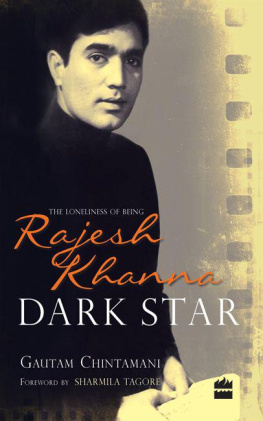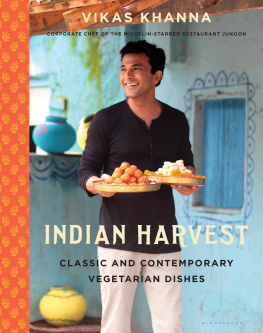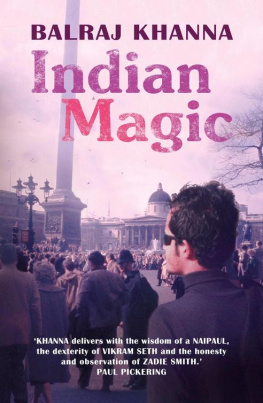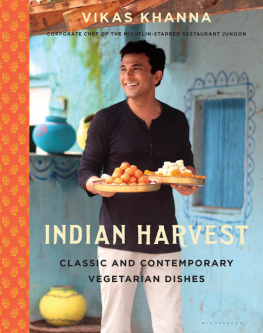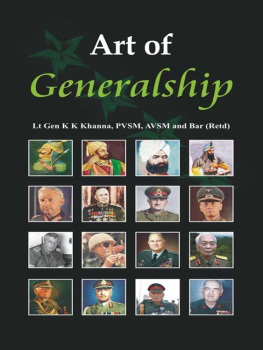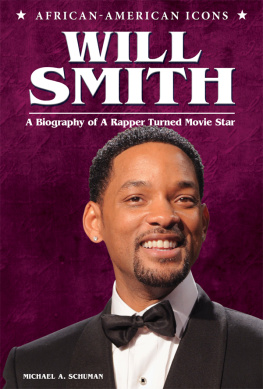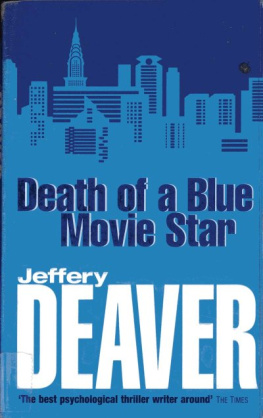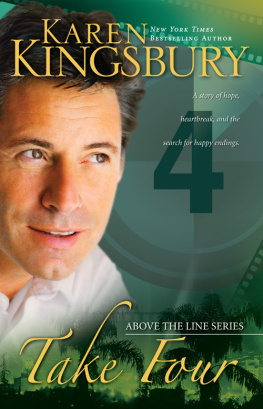| Dark Star: The Loneliness of Being Rajesh Khanna |
| Gautam Chintamani |
| HarperCollins Publishers India (2014) |
|
| Tags: | Biographies & Memoirs, Arts & Literature, Actors & Entertainers, Humor & Entertainment, Reference |
| Biographies & Memoirsttt Arts & Literaturettt Actors & Entertainersttt Humor & Entertainmentttt Referencettt |
FOREWORD BY SHARMILA TAGORE
The first-ever biography of the enigmatic Rajesh Khanna, the original 'superstar'
If ever a life was meant to be a book, few could stake a stronger claim. Like a shooting star doomed to darkness after a glorious run, Rajesh Khanna spent the better half of his career in the shadow of his own stardom. Yet, forty years after his last monstrous hit, Khanna continues to be the yardstick by which every single Bollywood star is measured.
At a time when film stars were truly larger than life, Khanna was even more: the one for whom the term 'superstar' was coined. Born Jatin Khanna to middle-class parents, the actor was adopted by rich relatives who brought him up like a prince. By the time he won the Filmfare-United Producers Combine Talent Hunt, he was already famous for being the struggler who drove an imported sports car.
With seventeen blockbuster hits in succession and mass adulation rarely seen before or since, the world was at Khanna's feet. Everything he touched turned to gold. The hysteria he generated - women writing him letters in blood, marrying his photograph and donning white when he married Dimple Kapadia, people bringing sick children for his 'healing' touch after Haathi Mere Saathi - was unparalleled. Then, in a matter of months, it all changed. Khanna's career hit a downward spiral as spectacular as his meteoric rise just three years after Aradhana (1969) and never really recovered.
Dark Star looks at the phenomenon of an actor who redefined the 'film star'. Gautam Chintamani's engaging narrative tries to make sense of what it was that made Rajesh Khanna and what accounted for his extraordinary fall. A singular account of a wondrous life.
DARK STAR
T HE L ONELINESS OF B EING
R AJESH K HANNA
Gautam Chintamani
Foreword by
Sharmila Tagore

HarperCollins Publishers India
To Tiny, for the Herculean task
CONTENTS
Fame is a bee. / It has a song / It has a sting / Ah, too, it has a wing. Emily Dickinson I know myself, he cried, but that is all F. Scott Fitzgerald ( This Side of Paradise )
The last time I met Rajesh Khanna was at an event in Kolkata. I was late and the dignitaries were already assembled on the stage. As I hurried to join them, a khadi-clad man with longish hair stood up and extended me an elaborate greeting. With my focus on the audience, I put him down as a politician. And then I heard him say Hi and saw him smile. With a shock I realized that this was Kaka. He was very thin but his eyes twinkled and his smile hadnt lost any of that old Rajesh Khanna magic. For someone who had been a close witness to his stardom, it was heartbreaking to see him so frail.
It was on the sets of Aradhana that I first met Rajesh Khanna. He had just been discovered by the United Producers Combine of which Shakti Samanta was a member. Samanta was planning a big film with Shammi Kapoor but since he didnt have his dates, he thought of making a small film with me and his new find. Aradhana turned out to be a colossal hit, and for Rajesh Khanna there was no looking back. Those were the days of star-pair craze and Sharmila TagoreRajesh Khanna became the newest addition. It was arguably the most popular on-screen partnership of the era, and one of the most successful partnerships in Hindi cinema ever.
Rajesh Khanna is remembered primarily as a romantic actor. He had a vulnerable, lost air about him that made women of all ages feel very protective. As a friend used to say, he made the old feel young and the young, frantic. I remember there were these long queues of women from nine to ninety outside the studios where we worked. Some garlanded his car, some married his photograph, and others sent letters written in blood. The hysteria was unprecedented. In films like Safar and Anand , he went beyond his romantic image. His sensitive portrayal of a man struggling against an unrelenting destiny with enduring humour and courage, will always be counted as amongst the finest. Although there have been better actors in India and in Hindi cinema than Rajesh Khanna, somehow these roles seemed custom-made for him and one felt nobody could have done them better.
There is nothing more difficult in Hindi cinema than acting in a song, and film students can learn a lot by observing him lip-sync Chingari koi bhadke in Amar Prem , a full six minutes in the confined space of a boat on the River Hooghly. How beautifully understated he is and how effectively he communicates the turmoil and the contradictions of his situation. He probably didnt have the attributes that are normally associated with a hero; what he had was a disarming smile, youthful energy, an innate sense of drama and a well-modulated voice which he used to his fullest advantage. Dialogues such as I hate tears, Pushpa (Amar Prem), Zindagi badi honi chahiye, lambi nahin, Babumoshai (Anand), Main marne se pehle marna nahin chahta (Safar) have been absorbed in our everyday spoken language. Head slightly tilted, nodding on cue, and a voice guaranteed to wreak havoc in a female heart, he delivered some of the most cherished lines ever in Hindi cinema. He starred in fifteen consecutive hits, a record that still stands. The guru shirt, his unbranded fashion statement, became a rage across class and gender. Undoubtedly, he was everyones hero and he was a phenomenon.
But all this adulation came to an abrupt halt. The tidal wave of the Rajesh Khanna craze receded as suddenly as it had begun. And like any elemental disaster, it left a scarred Kaka in its wake. One minute everyone was swooning over him, and another moment they had turned away. This too was a phenomenon. How could it happen? Perhaps the question is best left to film scholars to answer rather than a friend.
Rajesh Khanna was a man of contradictions and complexities. I have seen him being very generous with his friends and colleagues, showering them with expensive gifts. Sometimes he even bought them a house. But, in return, he expected far too much which ended up putting a strain on the relationship. But what affected me personally was his habit of coming late to work. I went to the studios at 8 a.m. and wanted to be back with my family by 8 p.m. But this was impossible since Kaka never arrived before 12 for a 9 a.m. shift. And we could never finish on time. As a result, the entire unit would pressurize me to work overtime and complete the schedule. This became the norm and since I had many films with Kaka, I found myself in a quandary. So, I opted to work with other actors more and more despite the fact that our pairing had been so successful. Probably even Kaka felt it was not such a good idea to have so many films with one actress one runs the risk of becoming stale. Whatever it was, we found ourselves working together in less and less films. And I must confess it was a huge relief.
Like his friendships, Kaka didnt nurture his stardom and allowed it to slip from his grasp. He failed to notice that the audience was changing, and that the roles he had been doing were becoming less and less relevant. Kaka either couldnt or didnt reinvent himself to remain contemporary, so much so that he became almost a caricature of himself and people began to mock him.
I am glad that at last there is a book on Rajesh Khanna. If ever a Hindi cinema star deserved a book, it is surely he. It is one of lifes ironies that while other contemporaries of Kaka, Amitabh Bachchan in particular, continued to go from strength to strength, Kaka was rendered inconsequential. Over the last decade or so, songs from his films have been immensely popular on radio and TV channels which thrive on the music of that era. However, the rediscovery of these songs, while connecting R.D. Burman and Kishore Kumar to a new generation, somehow failed to do the same for Kaka. I am happy Gautam Chintamani corrects this aberration. It is refreshing that he concentrates on the cinema of Rajesh Khanna and does not delve into personal issues which seem to be the rage these days. In the process, the reader discovers the romance of the time and what it meant to be Rajesh Khanna. I am sure this book would have made Kaka happy and I wish he was here to enjoy it. It is infinitely sad that it took that final advertisement of Havells fans and his subsequent death to reinstate him in popular discourse.

